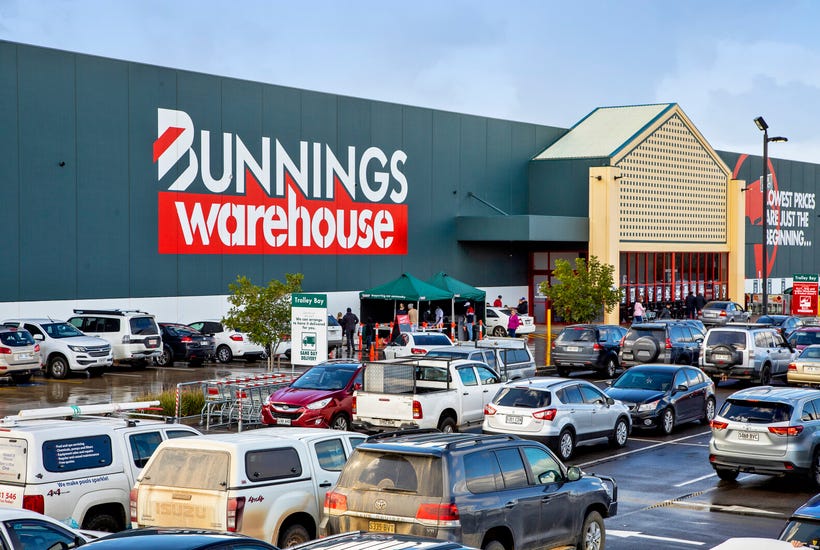Bunnings to expand network of warehouses and trade outlets

Bunnings plans to further expand its network of warehouses and a range of outlets targeting tradies, opening new stores and upgrading existing ones.
As well as growing its large network of Bunnings warehouses and small format stores, the hardware group expects to expand its tiles and professional tools stores and frame and truss plants.
Bunnings Group managing director Michael Schneider said up to 20 Bunnings warehouses and smaller format stores will be upgraded, expanded or opened each year.
“If we consider the next five years, we see lots of runway ahead for network growth and upgrading existing sites,” Mr Schneider told investors.
“We’re forecasting 15 to 20 expansions, upgrades or new Bunnings warehouses and small formats per year.”

Bunnings plans to grow its large network of warehouses and small format stores. Picture: realcommercial.com.au/for-sale
The group currently has 282 Bunnings warehouses and 68 small format stores.
After acquiring Australia’s largest tile retailer Beaumont Tiles last year, Mr Schneider said Bunnings is exploring opportunities to expand the 114-strong network of stores with Western Australia a priority region.

Bunnings has 114 Beaumont Tiles stores after acquiring Australia’s largest tile retailer last year. Picture: realcommercial.com.au/sold
“We also plan to expand our Tool Kit Depot network beyond Western and South Australia in the new financial year, moving into regions where we see strong underserved demand for professional tools,” he said.
Bunnings, which acquired the Adelaide Tools business in 2020, now has nine Tool Kit Depot stores, which target trade customers.
It has established the brand in Western Australia with four stores and has also refreshed the existing stores in South Australia.
Bunnings currently has three frame and truss plants, in the Melbourne suburb of Hallam, at Unanderra in Wollongong and another in New South Wales at Warnervale on the Central Coast.
It plans to double its frame and truss centres, which manufacture roof trusses, wall frames and floor trusses.
“To support more builders we’re opening three new sites over the next two years with the first in Melbourne’s outer west planned to open in the first half of the new financial year,” Mr Schneider said.

As well as upgrading and adding more warehouses, Bunnings expects to expand its tiles and professional tools stores and frame and truss plants. Picture: realcommercial.com.au/for-sale
Addressing parent company Wesfarmers’ annual strategy briefing day on Thursday, Mr Schneider said Bunnings will also extend its network of 33 trade centres over time.
“Our network will continue to expand over time supporting delivery to site and our commercial growth.”
Bunnings has five major distribution centres and recently opened its first fulfilment centre at Melbourne’s Laverton North, with Mr Schneider saying there were opportunities to expand that model in line with growth in online sales.
Mr Schneider said Bunnings and its more than 1600 suppliers were not immune from supply chain issues.
“But we’re not seeing duress, we’re not having tough conversations with our suppliers.”

Bunnings’ customers include tradies and households doing DIY projects. Picture: realcommercial.com.au/sold
While the housing boom is slowing down and construction costs are increasing, Mr Schneider indicated Bunnings is well placed to weather the downturn in the housing cycle as interest rates rise.
“We’ve been through these cycles before and certainly housing churn is remaining quite robust, notwithstanding what’s happening with rates at the moment.
“But should that change what we’d anticipate is what we’ve seen in the past, which is customers revert to doing more on their existing home.”
Bunnings stores are highly sought-after by investors with assets leased to the hardware retailer becoming even more highly prized during the pandemic.
Properties leased to the hardware group that have changed hands this year include the $65.3 million sale of Bunnings Nowra in NSW, $18.05 million sale of Bunnings Swan Hill in Victoria and $16.2 million sale of a new Bunnings store at Mount Isa in Queensland.
The sales campaigns recently closed for Bunnings Warehouse Epsom in Bendigo, Victoria, and the Bunnings in Kempsey North, NSW.







